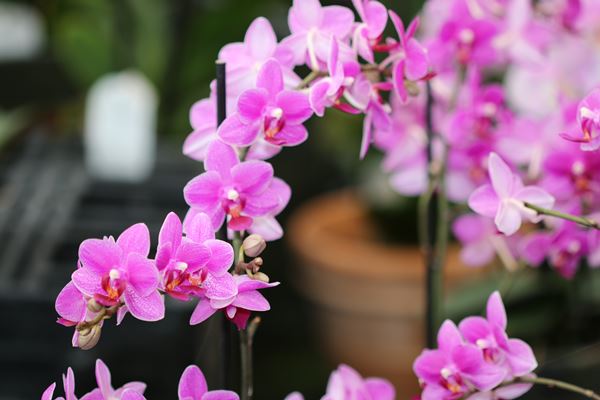Last updated on October 23rd, 2023 at 08:32 pm
Watering orchids – a difficult task? Friends often tell me that they have already brought one or the other orchid around the corner. And almost always, after a brief investigation of the cause, it turns out that it had something to do with watering.
Therefore, I would like to give some helpful information and tips on the subject of watering, to save perhaps one or the other orchid life. After all, watering orchids properly is half the battle to success with them.
Contents
What water should I use to water my orchids?
With few exceptions, orchids like soft water best. So, in many cases, watering the orchid with clean rainwater would be most ideal. Those who have the opportunity should resort to this. Otherwise, in some residential areas softer water comes out of the tap.
Whether this is the case for you, you can easily check on the websites of your water supplier, because usually the last water analysis results should be published there.
If you belong to the households where the water comes out of the tap quite hard, i.e. with a high lime content, there are several possibilities for watering orchids:
- Filter the water using a water filter.
- Let the water stand for a while before watering, so that the lime can settle.
- Buy distilled water in stores and mix your tap water with it or fertilize it with fertilizer. (Attention: Never water with pure distilled water).
Buy an osmosis system.
Only buy orchid species that do not mind hard water. To the latter belong for example the lady’s slippers of the genus Paphiopedilum. Also many multihybrids, for example of Phalaenopsis, are so robustly bred that they are less sensitive to hard water than their ancestors from nature.
You like my blog and don’t want to miss any more of my posts? Then I would be happy if you subscribe to my posts! Just enter your email address next to or below the post and confirm your subscription. You will then receive an email as soon as a new post goes online!
What temperature should the water be when watering orchids?
You should not give your orchids an ice-cold shower over the roots when watering them. It is recommended to water the orchids with water that has room temperature. This way the orchid will not get a cold shock.
On cold days, it is better to put rainwater inside for a while so that it can warm up. Water from the tap can be filled specifically with the right temperature and can be used immediately, if it does not need to be treated otherwise because of its hardness.

Watering orchids, dipping or spraying – which method is best?
This is probably where opinions differ the most on the subject of watering, and everyone has their own method and opinion. I will gladly tell you which method of watering seems ideal for me.
All my orchids are either in their transparent plastic pots in cachepots or in the Orchitop (affiliate link*). The orchids in the Orchitop are a special case. With them, all I have to do when it’s time – more on that in the next section – is fill the saucer full of water, done.
I water my orchids in regular pots with a planter by simply filling the planter to the brim with water. I then leave this in the planter for about half an hour and then simply pour it off again. It is important that the water is completely drained and that there is no longer a large puddle at the bottom of the pot.
This is because waterlogging is poison and, in my experience, the most common cause of orchid death. It causes the roots to die, ensuring that the plant will soon be unable to absorb either water or nutrients. Logically, this inevitably leads to death.
Just no waterlogging!
If for some reason I don’t have time to submerge the orchids, but still want to supply them quickly with a little water, I pour very little water per orchid into the planter. But always only so much that it can in no case come to rot.
And this is really only an emergency measure. Because by watering the orchid you quickly run the risk of leaving it with wet feet or roots that can not be absorbed quickly enough or evaporate. Which brings us back to the above-mentioned waterlogging.

Spray? Better not…
Spraying orchids is, in my opinion, not really necessary and purposeful. Although you can increase the humidity locally and for a short time in a room with little moisture in the air, but spraying is not much more useful in my opinion.
Water drops on the leaves can also leave unsightly water spots and, if they do not dry off quickly enough, can lead to rot, especially in the leaf axils. I have not sprayed my orchids for these reasons for some time and so far none have complained.
A simple trick to see if you need to water your orchids
To avoid watering the orchid too early again or too often in general, there is a very simple trick to recognize if the orchid needs water again. Simply lift the orchid and its transparent pot briefly out of the planter. If the orchid feels very light and, in the case of Phalaenopsis orchids, the roots are all silvery, it is time for the next watering.
If this is not the case and the orchid still has a little weight and some roots are still greenish or water vapor drops appear in the pot, you can calmly wait with watering.
Better to water once too little than once too much
Generally speaking, watering once too little is less harmful to the orchid than watering once too much. Many orchids can survive a short dry period, for example during a vacation, surprisingly well – if they are not standing in the blazing sun on the windowsill (which they should not be anyway).
The neighbor you ask to water the orchids in your absence is much more dangerous. He means well and gives the orchids, like all other houseplants, water at every visit. So it can quickly come to a nasty surprise when you return from vacation.
So just remember: most orchids can usually withstand dryness better than constant waterlogging. With water, too, the dose makes the poison.


